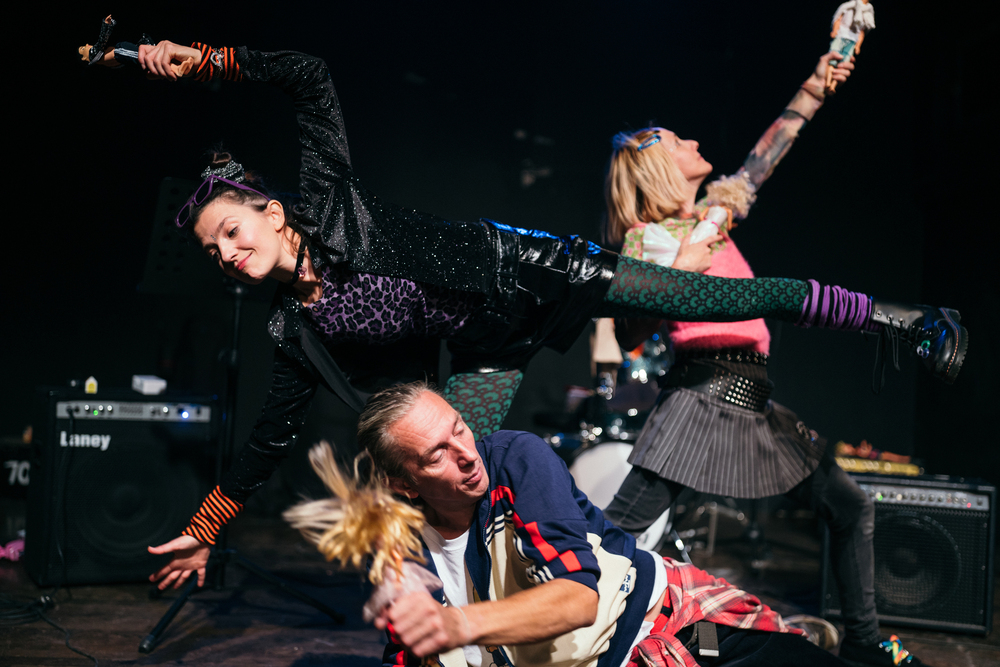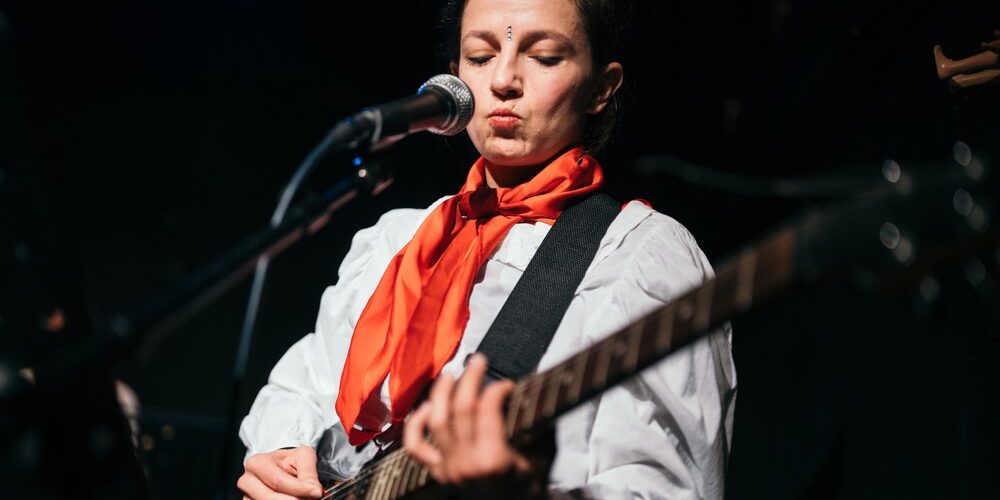KunstTeatar, Zagreb, premiere 21st October 2022
The violent change of political systems that took place at the beginning of the 1990s in Croatia also resulted in a sudden metamorphosis of the everyday. Your friends were not “drugovi” anymore and the shift from socialism to a capitalistic system also allowed Barbie to take the stage as the ultimate symbol of female prosperity, sold to little girls all over the free world. It was ‘bye-bye’ to all the not-so-fantastic-plastic dolls from the socialist era.
Adapted from the novel of the same name, Sloboština Barbie – the latest production of Zagreb’s Kunst – takes the form of a rock concert performed by a Nirvana-like trio. The show follows the story of Maša Kolanović and her company of friends, as she herself plays with dolls during the war in Croatia, ironically, in the basements of the old socialist buildings common to working-class neighbourhoods like Sloboština.
Although the alarms keep going off, there are more pressing matters for Maša and her gang than the political status of the country – like how to get their hands on real-life Barbies and how come Dea already have six while they don’t even have a Ken doll but only an inferior version called Dr. Kajfeš.
Through the eyes of a group of children, this narrative about how society can change its values and languages their codes overnight is told in a way that is childishly naive, though only at the first glance. Thanks to the abundance of pop culture references which are dominated by the Barbie world but not exhausted by it, the show – just as the novel was – is an instantly relatable, nostalgic experience to the generations who were born into this period of socio-political transition, or right after: Twin Peaks, Eurosong, Dynasty – all of these symbols, immediately spark something in the audience, partially thanks to the fact many of us still store Barbie dolls as souvenirs (including this review’s author).
Dramaturg duo Natalija Manojlović and Ivana Vuković’s decision to shape this show into a concert is spot-on, as it allows them to further explore the relationship with pop culture and how it becomes a way of expressing social identities, their transitions and the ways in which they overlap. The stage is consumed by guitars and drums and a number of music stands that will serve as a playground for multiple Barbie dolls.
Rock music was constitutive to the youth of Yugoslavia but also to the youth living after the Federation fell to pieces. The combination of anger and sensitivity, rebelliousness and gentleness that rock music offers, plays right into what Maša’s Sloboština Barbie ultimately is – a narrative about the violence hidden in the lightness of children’s play.
The music, which was composed by Ivana Đula plus Luka Vrbanić and performed by the three actors: Maja Kovač, Damir Klemenić, and Amanda Prenkaj, is catchy, powerful, and strengthens the overall appeal of the performance.

Photo: Karla Juric
Structurally, the show works in rhythmic blocs of songs exchanged in scenes in which the actors play with real Barbie dolls. Through this “puppet show” they share information about how boring music school was, how Sv(j)etlana likes a friend of Maša’s older brother (hinting that Svjetlana is ready to step out of the world of childhood, unlike Maša), how Dea’s father is prospering, which is shown through the number of Barbies Dea owns and how upsetting it is when the refugees come to Zagreb and their Barbie universe will be ruined by all the non-Barbie dolls that kids from Novska or Osijek bring with them from their burned-out homes.
The children’s play is, in its ludicrousness, violent in numerous ways, transcending the violence and chaos that surrounds the chidlren (which is, ironically, not all that bad as they still get to play). From the very sexual attempts of Dr. Kaifesh to seduce the most elegant Barbie to the literal playing of war operations in the name of the Croatian Republic, the happy-go-lucky tone of their play becomes tremendously complex, the humour pointing to an underlying disturbance. Yes, it might all seem normal – “it’s just kids playing” – but, in reality, it all smells of, if not trauma per se, then a world filled with brutality and cruelty.
Sloboština Barbie brings a childhood spirit to the era of 1990s Croatia, it brings lightness to a dark situation, only to ultimately accentuate the darkness. The mixture of song and story is easily digestible but while the performance does not lack in charm, the lack of an organic sense of beginning or end felt a bit off-key.
Even though the show chronologically tracks the fall of Yugoslavia and the war in Croatia, the performance did not, at any point manage to capture this passage of time. Instead, it felt as if this show, like a 70s rock concert, could have run all night, or abruptly ended at any moment like a punk gig. While the characters all share their vision of the world, there doesn’t seem to be any internal change or tension coming from these playful interpretations.
Even though they are rich in content, the basement games never slip into a more dramatic situation or any kind of conflict. We are nor truly affected emotionally or psychologically by the characters themselves. It doesn’t seem as if we are seeing Maša or Svjetlana grow up for real – being unsure, confused, angry, making missteps, potentially forming antagonisms or moments of deep connection – because we don’t see real change or repercussions in this act of play, Sloboština Barbie feels without a head or a tail and in this respect, it even feels a bit flat.
But this does not detract from the joy of watching it. This is one of the best shows of the season in Zagreb. And to be fair to the creative team, they had a task that came with high expectations. Sloboština Barbie is an iconic novel for a certain generation, so naturally, the hopes for the stage interpretation were high.
All in all, Kunst’s version of Sloboština Barbie does not disappoint but more importantly, it excels in being courageously and shamelessly fun and exciting, without slipping into banalities. On the contrary, it manages to employ humour to tell a story in a way that feels as compelling as it is wholesome.
Main Image: Karla Juric
Credits:
Adaptation and direction; Natalija Manojlović
Adaptation and dramaturg: Ivana Vuković
Costume: Ana Fucijaš
For tickets and further information, visit KunstTeatar.hr
Further reading: Ivana Vuković interview: I write about the things to which I don’t have the answers”








